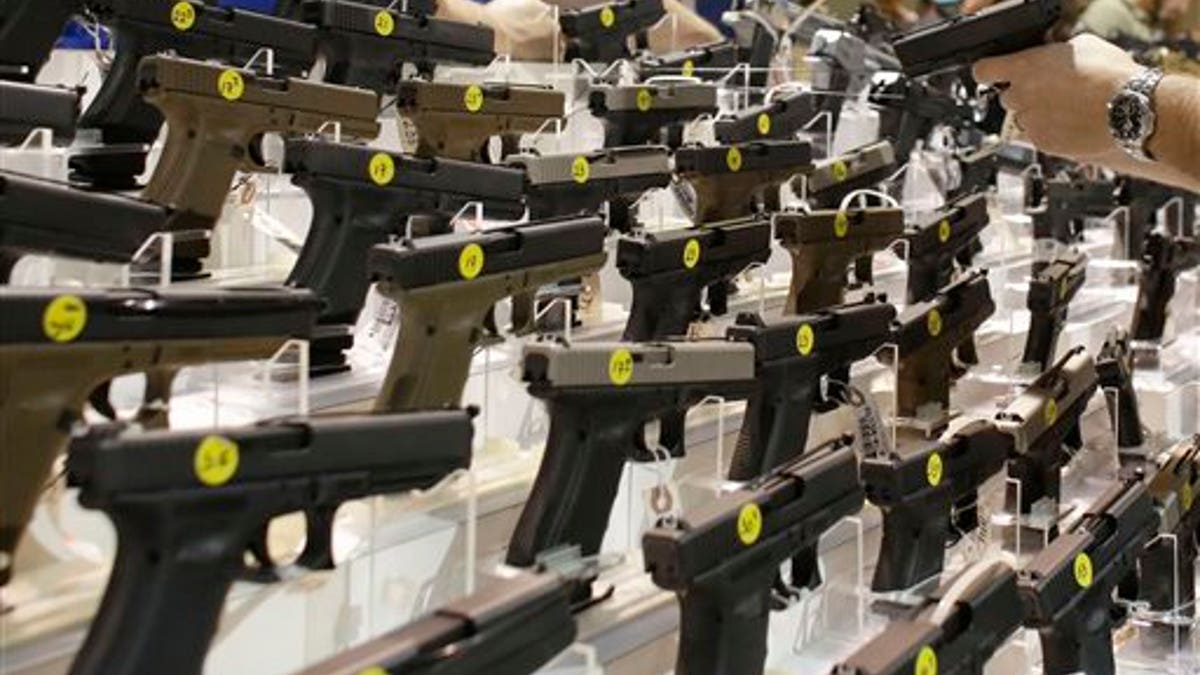
Firearms are on display at a gun show in Miami, Fla., on Jan. 9, 2016. (AP Photo/Lynne Sladky)
Your doctor might not ask you about gun safety, but she should, according to physicians writing in Annals of Internal Medicine.
Asking about firearm access is an issue of health - just like asking about car seats, alcohol use, sexual behavior, and smoking," coauthor Dr. Megan L. Ranney from Brown University, Providence, Rhode Island told Reuters Health by email.
While the risk of firearm-related homicide is highest among young African American men, most gun-related deaths in the U.S. result from suicide, for which older white men are at highest risk.
Doctors try to prevent health problems, but they are not great at firearm-related injury prevention. They usually don't ask about guns in the house, and they counsel poorly, if at all, about gun safety, Ranney and her colleagues write.
They urge physicians to initiate conversations about firearm safety, and they point out that no federal or state laws forbid those conversations when they are relevant to a patient's health.
Only Florida has a gag law concerning the discussion of firearms and what goes in the medical record, but that law is widely viewed as interfering with the doctor-patient relationship.
Ranney and colleagues describe three settings where those conversations are especially important: when there is an immediate risk that patients will hurt themselves or somebody else; when there are risk factors for violence in the home (domestic abuse, drug abuse, serious mental illness, and so on); and when patients belong to a group at high risk for violence to themselves or somebody else and when there are children or adolescents in the home.
In a related essay, Dr. Erik A. Wallace from the University of Colorado School of Medicine in Colorado Springs says he thought about buying a firearm after a patient threatened to kill him, but he ultimately decided against arming himself.
He told Reuters Health, "When you own a firearm for protection, you feel that you need to have easy access to a loaded firearm at a moment's notice. Many people believe that the benefit of owning a firearm for protection outweighs the risk. However, a firearm that is loaded and accessible caries a risk for injury or death, with suicide being the greatest risk by far."
"We need to decide as a society what the appropriate balance is between protecting our individual freedoms and society as a whole," Wallace said. "As we make changes to protect society, we must sacrifice our individual freedoms. As we make changes to protect our individual rights, then there is a greater cost to society. Given the public health crisis of gun violence, we as a society need to decide how many deaths each year are acceptable. I believe the number of firearm-related injuries and deaths we see today far exceed what our society should be comfortable with."
Dr. Steven E. Weinberger, CEO of the American College of Physicians (ACP), based in Philadelphia, told Reuters Health by email, "ACP's formal policy encourages physicians to discuss with patients the risks associated with having a firearm in the home. Our policy also speaks out strongly against legislative attempts to prohibit physicians from discussing firearms and associated risks, particularly when there are individuals in the home who are at increased risk of harming themselves or others."
"Physicians need to consider gun safety and reduction of firearms-related violence as an important public health issue, one which they have a responsibility to address with patients," he said. "This includes assessing risk and recommending ways to mitigate the risk of injury or death."







































